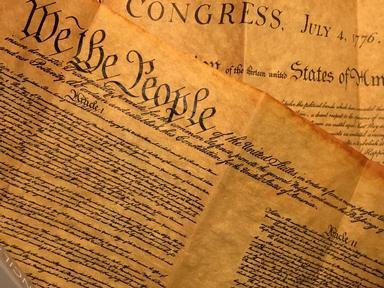Quiz Answer Key and Fun Facts
1. Freedom of religion, speech, the press, etc.
2. Right to keep and bear arms
3. No quartering of troops without consent
4. No unreasonable searches and seizures
5. Rights regarding self-incrimination, etc.
6. In criminal cases, right to a speedy trial, etc.
7. In civil law cases, right to a jury trial
8. No excess bail or fines, no cruel and unusual punishment
9. Enumerated rights do not deny unspecified rights
10. Rights not delegated to the United States are reserved to states or the people
Source: Author
agentofchaos
This quiz was reviewed by FunTrivia editor
stedman before going online.
Any errors found in FunTrivia content are routinely corrected through our feedback system.
